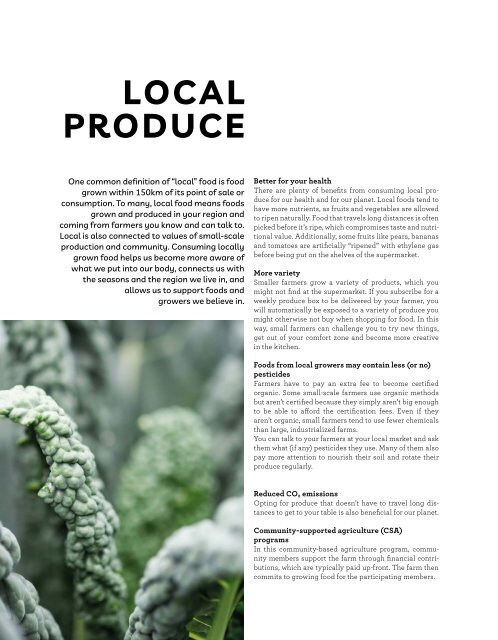KACHEN #21 (Winter 2019) English edition
- No tags were found...
Create successful ePaper yourself
Turn your PDF publications into a flip-book with our unique Google optimized e-Paper software.
LOCAL<br />
PRODUCE<br />
One common definition of “local” food is food<br />
grown within 150km of its point of sale or<br />
consumption. To many, local food means foods<br />
grown and produced in your region and<br />
coming from farmers you know and can talk to.<br />
Local is also connected to values of small-scale<br />
production and community. Consuming locally<br />
grown food helps us become more aware of<br />
what we put into our body, connects us with<br />
the seasons and the region we live in, and<br />
allows us to support foods and<br />
growers we believe in.<br />
Better for your health<br />
There are plenty of benefits from consuming local produce<br />
for our health and for our planet. Local foods tend to<br />
have more nutrients, as fruits and vegetables are allowed<br />
to ripen naturally. Food that travels long distances is often<br />
picked before it’s ripe, which compromises taste and nutritional<br />
value. Additionally, some fruits like pears, bananas<br />
and tomatoes are artificially “ripened” with ethylene gas<br />
before being put on the shelves of the supermarket.<br />
More variety<br />
Smaller farmers grow a variety of products, which you<br />
might not find at the supermarket. If you subscribe for a<br />
weekly produce box to be delivered by your farmer, you<br />
will automatically be exposed to a variety of produce you<br />
might otherwise not buy when shopping for food. In this<br />
way, small farmers can challenge you to try new things,<br />
get out of your comfort zone and become more creative<br />
in the kitchen.<br />
Foods from local growers may contain less (or no)<br />
pesticides<br />
Farmers have to pay an extra fee to become certified<br />
organic. Some small-scale farmers use organic methods<br />
but aren’t certified because they simply aren’t big enough<br />
to be able to afford the certification fees. Even if they<br />
aren’t organic, small farmers tend to use fewer chemicals<br />
than large, industrialized farms.<br />
You can talk to your farmers at your local market and ask<br />
them what (if any) pesticides they use. Many of them also<br />
pay more attention to nourish their soil and rotate their<br />
produce regularly.<br />
REZEPT TEXTE Vesela Firstname Savova Lastname Drews<br />
FOTOS Firstname Lastname<br />
Reduced CO 2 emissions<br />
Opting for produce that doesn’t have to travel long distances<br />
to get to your table is also beneficial for our planet.<br />
Community-supported agriculture (CSA)<br />
programs<br />
In this community-based agriculture program, community<br />
members support the farm through financial contributions,<br />
which are typically paid up-front. The farm then<br />
commits to growing food for the participating members.<br />
108


















